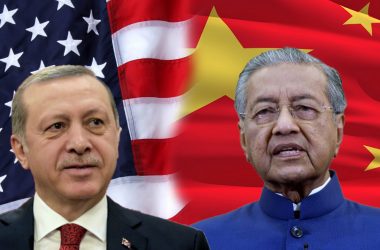Despite winning by 51.4% in the referendum, Erdogan’s face on the night after giving a speech of the victory reflected a crestfallen emotion as the vote was slightly lower than expectation. In his last presidential vote in 2014, he got 51% vote against HDP and MHP candidates. The recent referendum in Turkey proposed 18 point constitutional amendments, which include the controversial point of transformation to a presidential system. The question is, does the vote resembles the number and the intensity Erdogan’s supporter?
To some extent, this could be true as most of Turks when asked why do they say ‘YES’ is vis a vis with their confidence towards Erdogan. It is crucial that the people of Turkey and the rest of the world highlight and study some of the benefits and costs that will be gained if the ammendment is implemented and on why others reject the referendum.
Why AK Party supports the referendum?
Over 40 years, transformation to presidential system has been a heated discourse in Turkish politics. Economic and political crises, weak coalition governments, ineffective administrations and other problems associated with the parliamentarism are the factors that instigated the change to presidential system from parlimentary system. There would be several main points why AK Party supports the referendum:
1) To avoid re-emergence of political instability and the risk to return to weak coalition governments, as well as stalled the country’s democratic and economic progress under the parliamentary system. Under presidential system there would be no more government coalition so there would be no polarizing ideology in the government that can fuel political crises and fragmented political parties. The profound example of political crises and weak coalition in parlimentary system can clearly be seen in the coup 1980, left more than 5000 people killed cause by the growing political violence between 1975-1980, the government could not be able to solve the problem.
This reflect on the government at that time was polarized which is authoritharian Nationalist Action Party and the fundamentalist National Salavation Party on the right and many small radical groups on the left. The Justice Party was pulled to the right by its partners in the coalitions and the Republican People Party was pulled to the left by the leftist radical group.
2) The removal of grey areas, which the guardianship regime and their supporters within the civilian/bureaucratic elite exploit, from the political arena and Turkey’s political culture. [1]
3) The need to separate the executive branch and the legislative branch to increase the effectiveness and capabilities of both powers within their own domain, as well as to strengthen the executive in order to expedite the decision-making process, besides promoting greater accountability for the executive branch by introducing direct elections. [2]
Reasons to reject
The rejection of the referendum mostly come from the opposition party and majority of EU leaders. Below are the reasons underlying the rejection:
(1) The main reason for the rejection would be the lingering fear of an authoriatarian regime and eventually give way to one-man rule or dictatorship (read: Erdogan’s Neo-Ottomanism).
(2) In addition, critics and opposition especially the pro-Kurdish HDP party are propagating that Turkey’s territorial integrity are at stake as it is claimed that the presidential system would inevitably lead to the adoption of federalism and the creation of federal states. This is argued to lead Turkey to disintegration.
(3) Comparison were also being made where Turkey is compared to other countries that have adopted presidentialism, which experienced political instability and other problems especially in countries in Latin America.
(4) Turkey will become undemocratic because there will be absence of check and balance by the authoritharian regime.
Post-referendum on Turkey-EU relationship
Most of EU leaders claim this referendum is undemocratic and antoganistically against it. They claim that the presidential system would make the president exarcebate the situation in Turkey where opposition could be put under harassment and restrictions on campaigning. Currently, it seems to some people that the Kurdish lawmakers have been thrown in prison, rule of law and freedom of speech are collapsing and press are under strike.
Erdogan had accused Netherlands and Germany of Nazism after they prevented his officials from holding pro-referendum rallies for Turkish expats. This incident might be the reason Turkish Nationals from both countries vote for ‘YES’ in the referendum. Austria who blocked campaign rallies, also got a ‘YES’ vote from the diaspora there while Dutch Prime Minister Mark Rutte was buoyed in his re-election bid by standing up to Erdogan’s threats. Dutch Member of Parliament and European Parliament Rapporteur for Turkey, Kati Piri, has been very vocal, in a most antagonistic manner, about her reactions to the referendum results, calling the results “a sad day for all of the democrats in Turkey.” She also added, if this amendment happens, it will lead to the shelving of Turkey’s full membership talks with the EU. Furthermore, the Turkish lady minister was given a bad treatment in Venice Convention when she was detained by Dutch police because they want to do ‘YES’ campaign in the Netherlands.
We clearly see how the result of the referendum affects the behaviour of the EU when the European Commission called on Turkey the next day after referendum to investigate alleged irregularitiess. Commission spokesman Margaritis Schinas said that, “We call on the authorities to launch a transparent investigation into these alleged irregularities”. Whatever the result of the YES or NO in this referendum, the EU-Turkey relationship is at its mayhem since the failed of coup attempt that prompted the European Parliament in a non-biding vote in November to call for suspending Turkeys EU accession process but the YES vote could fueled up the accession more. So are these populist action democratic?
Is it really the death of democracy in Turkey?
Most of the Western media declare their sorrow and desolation about the result of the referendum by condemning the fall of Turkish democracy amid the majority (read: 1.3M majority) people in Turkey celebrate the victory. Looking deeply in Turkish modern history, we would have known that Turkish democracy suffered severe weak coalition governments. On the contrary, both democratic institutions and the economy perform better under single-party governments because parliamentarism was an obstacle on Turkish democracy. Moreover, in a presidential system, Turkish voters will directly elect their future presidents, which reflects a pure democratic element of an election.
According to academicians, Duran and Miş, a political system only becomes an authoritarian when there is the absence of effective checks and balances.As such, whether a given regime is authoritarian or democratic is independent of parliamentarism and presidentialism. [3] In addition, a limited of 2 years term of president is not such an authentic dictatorship. Not to mention the parliment will still have power and according to Article 10, if the president allegedly commits a crime, s/he may be subject to investigation.
Conclusion
It is interesting to see the rate of political participation across the world. The US election demonstrates 57.09% turnout and the Brexit referendum turnout was 72.2% while Turkey’s referendum turnout was 86.64%, an impressive rate of political participation. This shows how Turkish people are concern about the political future of the country and willing enough go out and vote for their nation’s future. Moreover, this referendum also allow the Turkish people to fully elect their own president while in America, the decision lies on the Electoral Collage.
On the other side, why would they solely claim Erdogan as an authoritarian while the America also has a similar presidential system. It is unfair to bombard Turkey with criticisms as an authoritarian while there are a lot of leaders in the other countries, which practice dictatorship like most of the the monarchies in the neighbouring region. Are the negative reaction towards the results of the referendum are merely signs and symptoms of fear and angst as they are losing political, geopolitics and economic grasp on Turkey? This might be the case.
References
[1][2] Nebi Miş, “Yeni Anayasa ve Başkanlık Sisteminde AK Parti’nin Yol Haritası,” Kriter, (November, 2016). [3] The Transformation of Turkey’s Political System and the Executive Presidency BURHANETTİN DURAN* and NEBİ MİŞ*
Iffah Fadhilah
MA Middle East Studies
Sakarya University












Well good article. Now I know referendum for Turkish